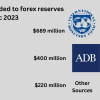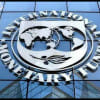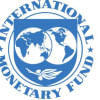IMF lowers forex reserves target for Bangladesh

The International Monetary Fund has set a new minimum foreign exchange reserves target for Bangladesh as the reserves have dropped at a faster-than-expected pace.
When the Washington-based lender approved the $4.7 billion loan in January, it had fixed a minimum net international reserve (NIR) of $26.81 billion for December this year.
Yesterday, the goal was revised downwards to $17.78 billion, according to documents of the IMF. The country will have to ensure a minimum reserves of $19.27 billion in March next year and $20.11 billion in June.
The overall balance of payments (BOP) has deteriorated, given an unprecedented reversal of the financial account leading to forex shortages, the IMF said in a report.
The report was released two days after the executive board of the lender completed the first review of the loan programme and the Article IV consultations and unlocked disbursements of $689 million in the second tranche.
The revision comes as the government could not meet two of the six targets that it had to reach in order to qualify for the second instalment. The two targets are related to the reserves and revenue collections.
For example, the minimum reserves target was set at $24.46 billion for June this year and it was later revised to $23.74 billion. The reserves stood at $19.56 billion at the end of the last financial year.
In October this year, the NIR amounted to $15.9 billion.
The government will have to raise tax collections by 20.41 percent to Tk 394,530 crore in June next year. Receipts stood at Tk 327,650 crore at the end of FY23 against the IMF target of Tk 345,630 crore.
The tax collection target has been kept unchanged at Tk 143,640 crore for December this year. Earnings will have to be Tk 276,170 crore in March.
In order to be eligible for the second instalment, Bangladesh had requested a waiver for the non-observance of the end-June 2023 performance criteria on the NIR caused by greater-than-expected worsening in external conditions and policy response that proved inadequate.
The IMF mission during talks with the government in October backed the waiver, based on the proposed corrective actions that entail further monetary tightening, supported by a neutral fiscal policy stance, and greater exchange rate flexibility, the IMF report said.
The underperformance has been partly external-driven, amidst aggressive global monetary tightening and the larger-than-expected spillovers into Bangladesh, it added.
Bangladesh, however, did not need a waiver from the board of the IMF.
The targets that were met are related to the budget deficit, external payments arrears, reserve money, social spending, and capital investments by the government.
Speaking at a virtual media briefing at the IMF headquarters in Washington, Rahul Anand, mission chief for Bangladesh of the lender, said in response to shocks, the government has taken several measures to deal with macroeconomic challenges.
Bangladesh Bank has tightened monetary policy, allowed greater exchange rate flexibility, and unified the multiple exchange rates. The authorities also kept the fiscal primary balance within the programme target.
"Thanks to these efforts by the authorities, and despite the difficult macroeconomic environment, the overall programme performance has been broadly satisfactory. I am happy to report that most programme targets and reform commitments were met," he said.
He urged Bangladesh to focus on containing inflation and rebuilding external resilience in the near term in order to tackle the current macroeconomic volatility and the balance of payments crisis.
In a letter to the IMF dated November 21, Finance Minister AHM Mustafa Kamal said the financing need for BOP increased further due to an unprecedented reversal in the financial account, which has impeded the government's efforts to restore foreign exchange reserves.
In addition, elevated global commodity prices and continued depreciation of the taka have kept inflation persistently high, placing a disproportionate burden on the poor, he said.
The minister said the updated programme will continue to be centred on upfront policy actions aimed at restoring macroeconomic stability and rebuilding the reserve buffer.
The next review of the 42-month programme will take place in May when Bangladesh is expected to receive the third installment from the IMF.

 For all latest news, follow The Daily Star's Google News channel.
For all latest news, follow The Daily Star's Google News channel. 







Comments